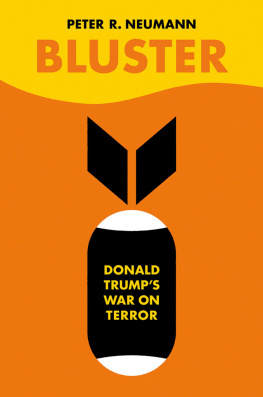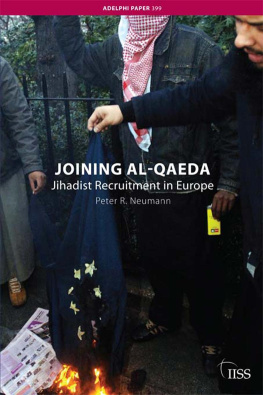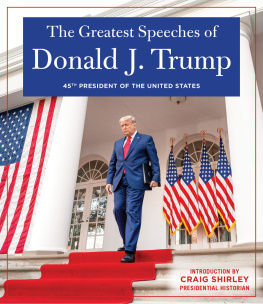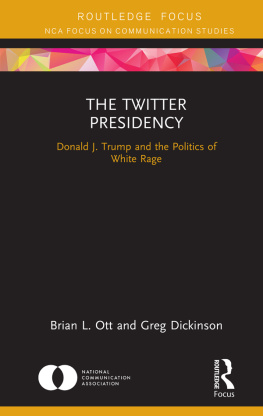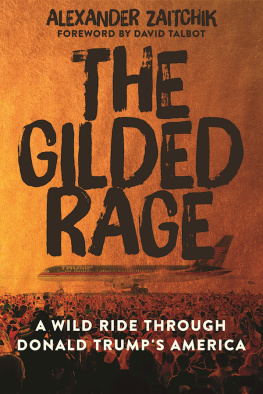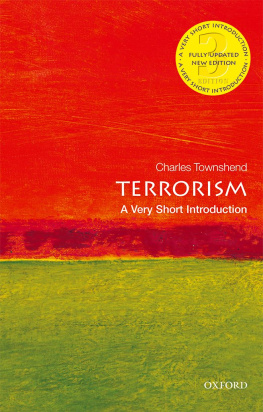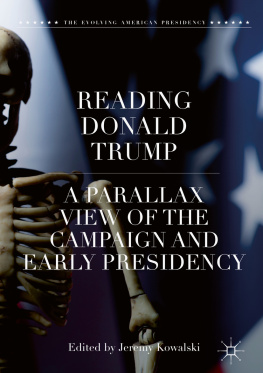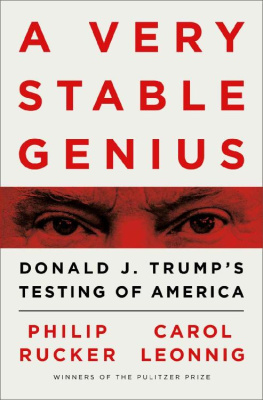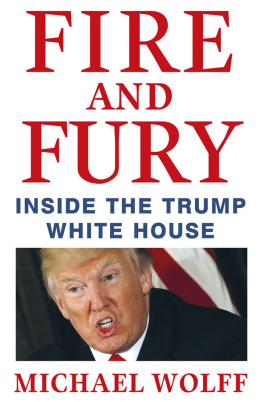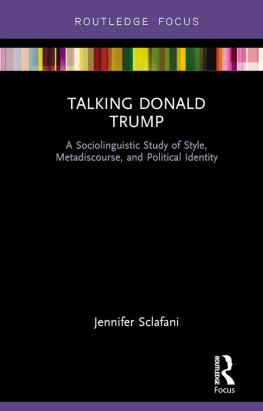BLUSTER
PETER R. NEUMANN
Bluster
Donald Trumps War on Terror


Oxford University Press is a department of the University of Oxford. It furthers the Universitys objective of excellence in research, scholarship, and education by publishing worldwide. Oxford is a registered trade mark of Oxford University Press in the UK and certain other countries.
Published in the United States of America by Oxford University Press 198 Madison Avenue, New York, NY 10016, United States of America.
Peter R. Neumann, 2019
All rights reserved. No part of this publication may be reproduced, stored in a retrieval system, or transmitted, in any form or by any means, without the prior permission in writing of Oxford University Press, or as expressly permitted by law, by license, or under terms agreed with the appropriate reproduction rights organization. Inquiries concerning reproduction outside the scope of the above should be sent to the Rights Department, Oxford University Press, at the address above.
You must not circulate this work in any other form and you must impose this same condition on any acquirer.
The right of Peter R. Neumann to be identified as the author of this publication is asserted by him in accordance with the Copyright, Designs and Patents Act, 1988.
Library of Congress Cataloging-in-Publication Data
ISBN 9780190099947 (print)
ISBN 9780197513828 (updf)
ISBN 9780197513897 (epub)
Names: Peter R. Neumann
Title: Bluster
CONTENTS
While writing this book, many people helped me in sharpening my ideas, finding sources and information, or pointing out mistakes and contradictions. I am indebted to my research assistants Amelia Birt and Maria Samsik, who sifted through a huge number of publications, as well as interviews, speeches, and statements made by Trump and his administration. Without their commitment and diligence, the book would have taken much longer to complete. I also benefited from conversations with experts and political insiders, such as Mark Freedman, Daveed Gartenstein-Ross, Jamie Geller, Joshua Geltzer, Matt Levitt, and Stephen Tankel. Especially helpful was Mark Stout, who read several versions of the manuscript and corrected many mistakes.
I am grateful to Kim Campbell, Sir Lawrence Freedman, and Bruce Hoffman, my academic and professional mentors, who have given me so much support over many years without ever expecting anything in return. This is also true for my colleagues at the International Centre for the Study of Radicalisation (ICSR) at Kings College London, such as Shiraz Maher and Katie Rothman, as well as Joana Cook, John Holland-McCowan, and Charlie Winter, who read various drafts or helped me look at my topic from different perspectives. I should also mention Thomas Hegghammer, who allowed me to present my ideas at a research conference in Norway; all my interviewees, who spoke openly and were generous with their time; and the anonymous reviewers, who provided useful feedback. Needless to say, the mistakes that remain are my fault alone.
Finally, none of this would have been possible without the encouragement of Michael Dwyer at Hurst, and the support of Andrew and Orly Wolfson at the Charles Wolfson Charitable Trust, whichliterallybought me the time to pursue this project. The person I am most indebted to, however, is my partner Zora, who put up with my moods, read numerous drafts, and challenged many of my ideas and assumptions. Without her, this book would have never been finished.
The first jihadist attack on American soil during Donald Trumps Presidency took place on Halloween. Shortly after 3pm on 31 October 2017, a grey pickup truck veered into a bike lane along the Hudson river in Manhattan, New York, killing eight cyclists and pedestrians before crashing into a bus. Police identified the attacker as Sayfullo Saipov, a twenty-nine year old immigrant and unemployed truck driver. Though Saipov had not been trained or directed by the group, Islamic State (which is also known as ISIS) later issued a statement claiming he was a soldier of the Caliphate.
Unlike other Presidents, who have responded to terrorist attacks by calling on Americans to unite, stay calm, and pray for the victims, Trumps reaction was furious. Over the following four days, he mentioned the attack in nineteen tweets, several phone calls to foreign leaders, and in public comments before a Cabinet meeting. Within minutes, he posted several tweets in which he called Saipov a very sick and deranged man, and warned that Islamic State must not [be allowed] to return, or enter, our country.
When it emerged that Saipov had been born in Uzbekistan, a country in Central Asia, Trump lashed out against vetting procedures and blamed the Democratic Party for importing Europes problems.
As it turned out, none of Trumps announcements were true or relevant. Despite claiming that Islamic State was being hit ten times harder, In the end, Saipov wound up being tried in exactly the same way he would have been tried under the previous administration. Apart from Trumps bluster, and contrary to Pences statement, nothing seemed to have changed.
President Trumps response to the Halloween attack was part of a pattern. Since the first days of his campaign, Trump has portrayed himself as tougher than tough. He has told supporters that defeating Islamic State justified any means, and that he would authorise whatever plan gets the job done. He has spoken in favour of waterboarding, torture, indiscriminate bombings, and the killing of terrorists families. He has linked terrorism with Islam, warned of Muslim immigration, and accused American Muslims of celebrating jihadist attacks. Other than the border wall with Mexico, there is no other topic which Trump has deployed more frequently, strategically, and with more vigour and excitement, especially during the election campaign and the early days of his Presidency.
As in Saipovs case, however, the policy impact of his outbursts has been limited. Although some rules and processes have changed, the basic operational framework that has guided counter-terrorism since President George W. Bushs second term remains in place.
At the same time, it seems wrongand impossibleto ignore Trump. He is, after all, President of the United States, and every time he expresses his views in an unscripted remark or tweet, it has an immediate impact on the political debate, sets expectations, dominates the news cycle, and forces bureaucrats and political leaders to respond. It also affects foreign audiences, and shapes their attitudes and actions towards America.
In short, there is no easy way to make sense of Donald Trump and his War on Terror. Is it all bluster, aimed at mobilising his base, or does it represent a genuine shift from previous administrations in Washington? What are his core convictions, and to what extent do they correspond with substantive changes in counter-terrorism policies? How will his words and actions affect communities, civil liberties, and the relationships with other countries? Most importantly, is it going to make Americaand the worldsafer?
* * *
This book builds on the many debates about American counter-terrorism that have taken place since the September 11, 2001, As a consequence, War on Terror has become shorthand for the American campaign against terrorism since September 11, 2001, and this is how I intend to use it.

